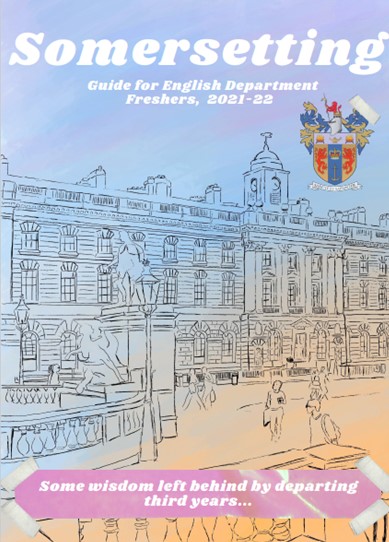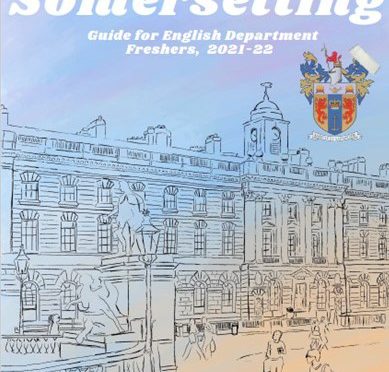By Carl Kears and Cornelia Sheppard Dawson
Each year, departing third-year students in our department put together a guide for arriving first years. This year’s magazine – titled “Somersetting” – offers a student perspective on studying English at King’s and addresses some issues of concern for new students. During induction week, the blog will be spotlighting sections of this year’s magazine.
First up… Cornelia Sheppard Dawson interviews Dr Carl Kears, Head of First Year and Lecturer in Medieval Literature.
What does your role as head of first year mean for students?
It means that there is another person to come and talk to, in addition to your personal tutor, lecturers or seminar leaders, about anything to do with being a first-year student. I have an office hour that is set aside for first years, which means that students can come by and have a chat. As head of year, I am also involved with the Skills and Support for your English Degree (SSED) programme, made up of sessions that run throughout the year, covering things like getting started at university, or beginning essays – I run a few of these and it’s where I get to first meet a lot of students. Finally, being head of year also means that I work closely with first-year reps, taking in and responding to feedback from the year group at large. It’s great!
What’s something the students can look forward to in first year?
Wow. Well, as a new student of English at King’s, you’re going to learn so much over the next three years. There’s a writer (or a host of writers), or a period of literature, or a poem, or a thinker, that you haven’t met yet that will change the way you look at the world and alter the way you take it in or respond to it.
The first-year modules will open a rich, diverse, and dynamic landscape of literature for you, from experimental new poetry to non-canonical – or what the first-year English module on ‘Writing Race, Writing Gender’ calls ‘para-canonical’ – literature. You will even read some of the most fragmentary, ruined, and mysterious oldest English writings. Some of it will pass you by. You will wrestle with some material. You will dislike some of it. Some of the literature you will study won’t speak to you. It’s worth embracing all of this. You will find something you want to know more about. And, when you do, you have the space and the expertise all around you to pursue your interests.
Something you will begin to enjoy as a first year is the sense of collaboration that grows from thinking with people in the classroom: seminars are there for trying out in-progress ideas, for developing and sharing them. These are creative spaces, too, where we can craft new responses, question how and why we’re examining our material, and do things together.

What’s something that first years always worry about that they don’t need to?
Some first-year worries only dissipate as time passes (e.g., I can say ‘you don’t have to read absolutely everything listed on a module every week’ or ‘it’s fine if you couldn’t finish the reading, or do it, it’s there for you to come back to when you can’ but it takes time to
get used to having a whole degree before you, and it takes time to find out how you work best as a critical and creative thinker at university).
When I started university as an undergraduate (at King’s, actually!), I moved to London from a very working-class environment in northeast England. I was the first person in my family to have even considered university education. At first, it was very overwhelming: my fellow students seemed to know so much about how things worked (all those new university online systems! All of that reading that didn’t make any sense to me!), while my first tutors were asking me to think about literature in ways I’d never expected. But the more time that passed, and the more I discussed things with my lecturers and my peers, I realised that I could talk to people in my year group about how I didn’t understand that theory, or particularly like that critic, and could carry that into my classes for discussion. There was time to explore, to find things out, to visit things and see things and ask questions and to develop my thinking. I was given the opportunity to carve a path, to pursue the writing and art that was most compelling to me.
What’s one piece of advice you want to give the new first years?
If things feel as though they are getting on top of you, or even if it seems like university is moving in slow motion, or just not right at first, remember that time is on your side and there are a range of people to talk to in the Department. You are going to learn so much.
So much will change, both slowly and quickly. Take your time. Visit some tutors in office hours. The first year is about getting a sense of things and exploring what’s out there. You will find that word, or that passage, or that genre of literature that you didn’t even imagine you would fall for, but it’s going to happen over the course of three years (three years!). Don’t rush. Take it in. Enjoy yourself!
That wasn’t really one piece of advice, but there you go!
The full magazine can be found here: Somersetting Magazine. Check back tomorrow for more coverage on the department blog!
Blog posts on King’s English represent the views of the individual authors and neither those of the English Department, nor of King’s College London.
You may also like to read:

